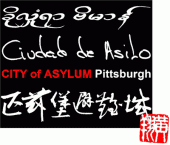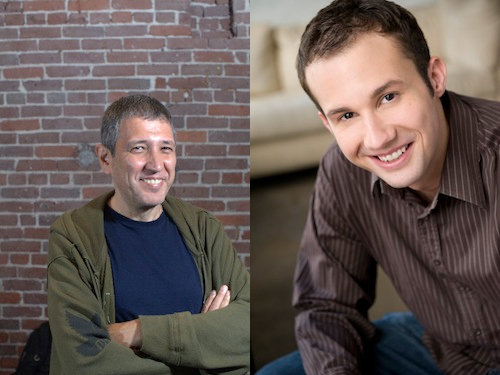An Interview with Justin Fortunato
by Matthew Zola / November 15, 2012 / 1 Comment
“Realism comes in the metaphors”
- Israel Centeno and Prime Stage Theater: A Collaborative Reading

- Thursday, November 15th from 7:00-9:00
Opening Reception: 7:00
Event: 7:30
FREE with a reservation
COAP will confirm all reservations
Reading at City of Asylum/ Pittsburgh,
330 Sampsonia Way, Pittsburgh
Today, Thursday, November 15, City of Asylum/ Pittsburgh (COA/P) will host a reading of Israel Centeno’s novel La Torre Invertida (The Tower Overturned), which is currently being translated into English by Ezra Fitz.
The Pittsburgh Post-Gazette has called The Tower Overturned “a very unusual political novel, blending elements of the classic gothic novel—vampires, wizards and magicians—with the sensuality of the Afro-Caribbean religious tradition.” During the reading, Centeno, a current COA/P writer-in-residence, will read a selection from the novel in its original Spanish before theatre director Justin Fortunato reads its English translation.
Justin Fortunato graduated from Point Park University in 2011, majoring in Musical Theater. He has been involved in various theater projects, including Pittsburgh’s Civic Light Orchestra, the REP, and Carrnivale Theatrics—the latter of which he is both co-founder and artistic director. Last Sunday he wrapped up his most recent project, directing Ray Bradbury’s Fahrenheit 451 for the Prime Stage Theatre Company. Centeno’s tribute to Bradbury in The Tower Overturned makes Fortunato a perfect fit for tonight’s reading.
Sampsonia Way spoke with Fortunato about the totalitarian universes these texts inhabit, how working with Farenheit 451 has changed his thoughts on censorship, and how he brings “literature to life” through theater.
One of the aims of Prime Stage Theatre is to discover the fusion of live theater and literature. What is this fusion and how did it play into your current production of Fahrenheit 451?
Prime Stage Theatre Company’s main goal is to bring literature to life. Our production of Fahrenheit 451 was the culmination of what Prime Stage really believes in, which is that literature and the live stage are the final weapons we have against the media and individual thoughts. I started working on the show in April, and living with it for half a year really opened my eyes to how I don’t read enough and how I don’t keep as up to date with things as I should. In our production for Fahrenheit 451 we tried to do something edgy and risky by making the show more guttural and important to today, while still honoring Bradbury’s work and the overall impact of what he wanted to do. So we did it in this burnt-out progressive world where fires are started in the street every day, full of burned rubble and people. The Tower Overturned is in a similar vein to that in many ways.
How does that inform your approach to the reading you’ll be doing on Thursday? Are there any difficulties with the fact that The Tower Overturned is a text in translation?
If you’re in a theater, doing a reading, the outside observer usually thinks it’s just an actor sitting down. But whenever I do a reading I like to have a clear idea of what the text is about, and where the beat changes are, so I’m really able to tell the story. I love doing readings because, while you don’t have to rehearse as much as you would for a play, you can still have that theatrical setting and a theatrical effect on people. With that said, the translation is definitely a challenge and you have to approach it differently, but my main goal is to capture the overall arc of the text; the rest comes naturally from there.
Ostensibly, both The Tower Overturned and Fahrenheit 451 stray from realism, but they do so while depicting terrible realities in history and humanity. What effect does this have on you as a reader?
The Tower Overturned is set in a fantastical world with witches and wizards. It doesn’t try to be reality, which is what I think is so wonderful about it. But the realism comes in the metaphors that Israel uses, and the poetry of his text is really effective at making people think. You can give them naturalism, you can give them realism, and that connection happens right away. But Israel doesn’t use that—he uses these mythical and historical references, which I thought I knew, but even after reading the piece three or four times, I had to look up online to understand.
In real life we have small talk where not everything we say necessarily matters, but in a play or a book, every word and every sentence is thought out and chosen specifically to further the development of the story. The Tower Overturned does this really well.
Freedom of speech and censorship are also huge themes in Fahrenheit 451 and The Tower Overturned. Has working with these texts changed your understanding of those concepts?
There’s a quote from Ray Bradbury: “I don’t try to predict the future, I try to prevent it.”
So many people have written essays and doctoral theses on how the point of Bradbury’s novel was to talk about government censorship. But he said the main point of the novel wasn’t that at all. He said that governments don’t censor you from growing, you censor yourself. In the world he created, the public stopped reading on their own accord. As I said before, producing this play opened my eyes to my own reading habits and how I should do more to keep up to date on important things. It was an altering project to work on.
The motorcyclist in The Tower Overturned really reminds me of the firemen in Fahrenheit 451—this kind of hooligan, big brother type—and that’s what I love about the piece: There are so many layers to it, even now I’m sure I haven’t gotten to the bottom of it yet.
The reading is going to be an enjoyable night. You’ll get to hear this beautiful piece of work and tickets are free, which is wonderful. When you hear the piece the first time, some of it will land and some of it will go over your head, but it’s definitely going to be something you’ll want to talk about after the event. It’s going to be a fun night.






One Comment on "An Interview with Justin Fortunato"
È difficile trovare persone competenti su questo argomento, ma sembra che voi sappiate di cosa state parlando! Grazie